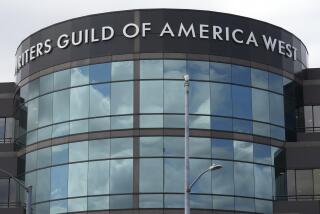The writers’ fight with talent agencies continues, but one firm is bowing out

- Share via
As Hollywood writers continue waging their fight against talent agencies, with little progress to show after several negotiating sessions, one boutique agency is declaring its neutrality from the four major agencies that dominate the entertainment industry.
But the small firm stopped short of siding with the writers, saying that it still won’t sign the proposed code of conduct that writers want to impose on agencies, limiting their power to charge lucrative packaging fees and engage in TV and movie production activity.
Abrams Artists Agency said in an internal memo Wednesday that it isn’t taking sides in the dispute between the Writers Guild of America and the Assn. of Talent Agents, the trade organization that represents Hollywood agencies.
“We are not for the WGA; We are not for the ATA,” the memo stated. “We are for our clients. We will be a place where when we represent a writer, actor, or any other artist, they feel at home.”
But Los Angeles-based Abrams signaled that it wasn’t pleased with the way the ATA has been handling the negotiations thus far.
“Quite honestly, they haven’t consulted with us regarding the writers,” the agency said in the memo. “They have been informing us about their efforts, but they are really only concerned with the big four— especially since so much of the argument is over packaging, and those firms do the vast majority of it.”
The big four agencies are Creative Artists Agency, WME, United Talent Agency and ICM Partners.
The ATA didn’t immediately respond to a request for comment.
Packaging fees are one of two issues at the heart of the dispute between writers and agencies. The longstanding practice allows agencies to extract fees from a TV show or movie for putting together talent on the project from its client roster.
Writers are arguing that agencies have prioritized packaging fees over client representation, while agents say that clients make more money on packaged shows, in part because they don’t have to pay the usual 10% commission.
The second issue is the move of some agencies into the world of TV and film production. The WGA believes this presents a conflict of interest, since agencies will be able to both employ and represent talent.
Agencies say they can manage the potential conflicts by involving talent’s managers and attorneys more closely.
WGA members are voting on the proposed code of conduct that would effectively end the two practices, with voting scheduled to conclude Sunday.
The two sides have until April 6 to work out a new franchise agreement, or the WGA has threatened that its members will fire their agents.
Abrams hinted Wednesday that it might be interested in taking on writers who find themselves agent-less after the deadline passes.
“Whatever happens, if some writers become available—we don’t care how big or small they are—if they are the kind of people who are congruent with what we stand for, then let’s find a home for them.”
More to Read
Inside the business of entertainment
The Wide Shot brings you news, analysis and insights on everything from streaming wars to production — and what it all means for the future.
You may occasionally receive promotional content from the Los Angeles Times.











